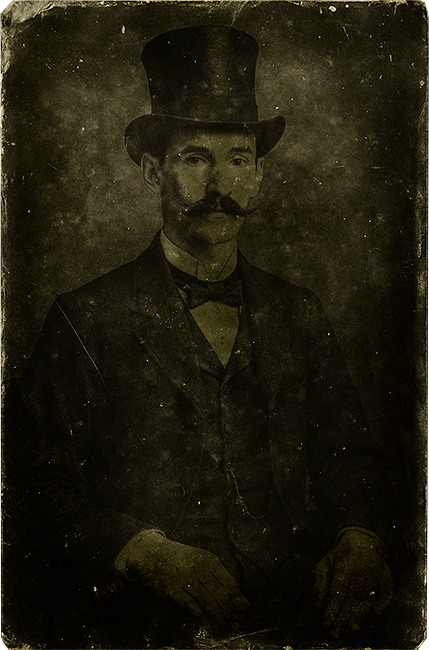
|
|
Dr. Xavier Holt died on Christmas Eve of 1887 in a tragic train wreck. |
Christmas Eve of 1887 brought unspeakable tragedy. Holt was the engineer on a snowy holiday afternoon run from Pilot Grove. On the final approach into the Fallholt Station through Svennson’s property, a foot-long piece of the track had buckled suddenly, the sudden bottoming out causing the engine to burst into flames. Holt, unable to overcome the flames, lost control of the train and crashed into Fallholt Station in a tremendous and twisted flaming wreck. Xavier Holt and sixteen others perished in the tragic incident. Twenty were injured. The station was destroyed, several other buildings sustained major damage.
The investigation that took place on Svensson’s property showed the small portion of rolled steel rail that gave way had become rusted to the point of decay, as if it were an older iron track. No other such points of rust or decay existed on the five-mile stretch between Fallholt and Pilot Grove on inspection by Fallholt and State authorities.
This tragic event was demoralizing to the people of both Fallholt and Pilot Grove, and things there were ground to a halt as they mourned the loss of many citizens of the two towns, but especially their leader and mentor, Dr. Xavier Holt, who was aged sixty at the time of his passing.
Thomas Hawkins, printing press owner and editor of the Fallholt Hawkeye, assumed the primary leadership role in Fallholt with support from the remainder of the Town Council. Holt’s locomotive and cars were irreparably damaged, and it was decided that addressing the rebuilding of Fallholt Station, repairing its many business houses, and reconstructing the rails would not even be discussed until the following spring.
Xavier Holt was memorialized in the Fallholt town square on New Year’s Day, 1888, and per his documented wishes, no burial plot or headstone was constructed, instead his ashes would be scattered into Badger Creek in Fallholt. Morale in Fallholt hit a low point with Holt’s absence and a particularly bitter winter having set in. The wood rubble from the disaster was used to fuel the homes of Fallholt all winter long.
With word of Fallholt’s sudden and dramatic reversal of fortune spreading all over the State, Gellar Svensson had a woeful time attempting to convince his friends and commerce partners that the small township’s fortunes could continue under Hawkins’ leadership, and as such they could not secure the labor force needed to construct the spur track to Blue Earth, much less commence the rebuilding of the Station. No trains would ever run again in or out of Fallholt. Trade with the town would slowly dwindle, save for Svensson’s produce from his well-run corn farm. By 1889, Gellar had largely absolved himself of township matters and had become quite a socialite and eccentric and was known all over the state, frequently traveling the rail from Blue Earth to the Cities and returning with odd antiquities and even more odd tales of city life.
Erwin Wrolstad’s school in Fallholt was so well-regarded, that Pilot Grove hired him to run their schools as their Superintendent, and Fallholt’s school was then absorbed into their system permanently in the fall of 1889.
Hawkins had shuttered the Fallholt Hawkeye at the beginning of 1889 with a declining readership after Holt’s death and the need to focus on his duties with the management of what remained of the town.
Ta-Koda was tragically shot to death after a quarrel just outside a Blue Earth saloon in June of 1892. No man was punished for the crime.
Eventually, in 1900, the Township of Fallholt was stripped of its township status by the State of Minnesota and was ultimately absorbed into the town of Pilot Grove, save for the Fallholt Sheriff and the Fallholt Post Office, which were allowed to continue operating. When Zip Codes were implemented in 1963, Fallholt’s Post Office was granted zip code 56040.
Fallholt’s residents remained proud of their Township, even if it was no longer recognized as an official entity, and was reflected in the local signage and conversation, as “being from Fallholt” was a thing to boast about given its tortured history.